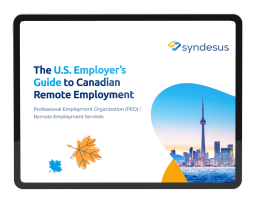Immigration litigation is increasing in popularity. A few of these cases have made the news — such as this immigration lawsuit filed over unreasonable delays that have held their citizenship hostage for years — but others haven’t.
H-1B specific litigation has increased as well, with immigrants filing lawsuits that are challenging existing procedures, including the option for multiple applications to be filed for one individual, thus increasing their chances of selection.
There’s no denying there has been a big push to litigate these cases. But what about companies or individuals who don’t want to litigate because of cost, time, uncertainty, or public exposure?
Canada can be the ultimate option for these companies when an H-1B petition fails, litigation is not an option, and no US immigration options remain.
This article examines the increase in immigration litigation in the US. Our discussion will also focus on how Canada can be a viable option for those who don’t want to take this route.
Here’s how litigation is pushing cases through the US immigration process
There are many H-1B challenges facing the tech sector, including an 85,000 H-1B visa cap, a decreasing probability of being selected in the lottery as more and more prospective H-1B workers register, a decades-long Green Card backlog, especially for Indian nationals, and more. This issue was made more complicated by the COVID-19 pandemic and additional challenges that arose during the Trump administration.
H-1B applicants who face prolonged wait times or are getting their H-1B applications denied or unreasonably challenged have increasingly turned to litigation as a last resort.
Litigation can be expensive, with clients often billed by the hour, and results are not always guaranteed.
Projections show that more than 6,200 such cases will be filed by the end of fiscal year 2022. This is because people attempt to move their cases along after waiting months, or even years, for them to be processed. Rather than drag out litigation over H-1B delays, government attorneys have settled H-1B-related litigation, particularly over processing delays.
But litigation may not always be the best option. Litigation can work, but it can be costly, with clients often billed by the hour, and the desired outcome is not always achieved.
Additionally, litigation can be time-consuming, and the details of your H-1B case may be made public once it is filed in a public court.
Plus, with the large increase in litigation, government attorneys may also become less inclined to settle to disincentivize delay cases. Therefore, applicants who do not wish to or cannot litigate often find themselves without options.
While progress is being made to reduce the immigration backlog, for many this is too little too late. There are some creative immigration solutions that may suit those who feel out of options and want to avoid going to court with their US immigration application.
One of those is remote employment in Canada with their US employer, which is all made possible with Canada’s world-class immigration program, the Global Talent Stream (GTS).
How H-1B tech workers with no other US immigration options can work remotely in Canada
Remote employment in Canada, utilizing Canada’s world-class immigration program, the Global Talent Stream (GTS), is an excellent alternative for US employers and tech workers frustrated with the H-1B process and looking to avoid litigation.
GTS is currently one of the world’s fastest immigration pathways for tech workers and offers a streamlined pathway to residency in Canada
GTS — launched in 2017 as part of Canada’s Global Skills Strategy — empowers Canadian employers to speed up the process of hiring foreign workers to fill specialized jobs.
An employee can obtain authorization to work in Canada within less than two weeks, and within a few weeks from there, obtain a Canadian work visa, relocate, and begin working in Canada
GTS is currently one of the world’s fastest immigration pathways for tech workers and offers a streamlined pathway to residency in Canada – where eligibility for Canadian permanent residence can be possible in one to two years, and citizenship in around five years.
When an employee has permanent residence status, they can receive most social benefits available to Canadian citizens.
There are even long-term, so-called boomerang strategies available to eventually move the tech worker back to the US, after they gain residency and citizenship in Canada if they really want to. In other words, you don’t have to give up on the American Dream entirely.
The GTS program is only available to employers with a legal presence in Canada, so if you’re a US-based employer, you might be wondering, “How can GTS help me retain H-1B hopefuls who can’t stay in the US?”
This is a great question, and the answer is that you don’t actually need your own established Canadian office or legal entity to take advantage of the GTS.
Employers of record (EORs) in Canada can act on your behalf as a Canadian legal employer so that you can hire remote tech workers.
While maintaining control of your employees in terms of compensation, work responsibility, and deliverables, the EOR (who will handle all the legal and operational aspects of employment such as immigration, benefits, HR, and payroll) will also handle the immigration process.
Syndesus does exactly this!
If you don’t want to litigate H-1B issues, Syndesus can help you employ your tech talent in Canada. Rather than litigating H-1B issues, Syndesus can help you employ Canadian tech talent.
Whether you’re a small US tech startup or a large corporation, Syndesus can help you avoid the headache of dealing with H-1B visa issues by helping you move your unsuccessful H-1B applicants to Canada.
You can bypass the uncertainty, lottery, backlogs, and litigation, and instead, hire and retain all the skilled tech employees you need, remotely in Canada.
Syndesus offers both Professional Employment Organization (PEO) and Employer of Record (EOR) services, which cover all hiring, immigration, payroll, HR, tax, legal, and other administrative processes.
Our turnkey services enable US tech companies to move their existing tech workers from the US to Canada, and eventually even hire new Canadian tech workers in Canada.
Let us help you hire and retain remote talent in Canada!






